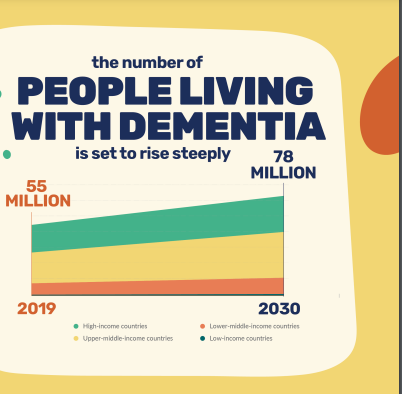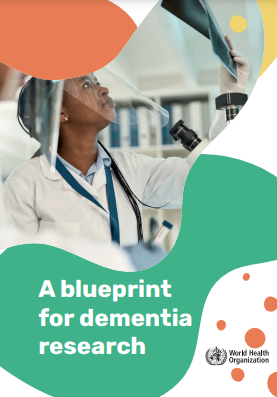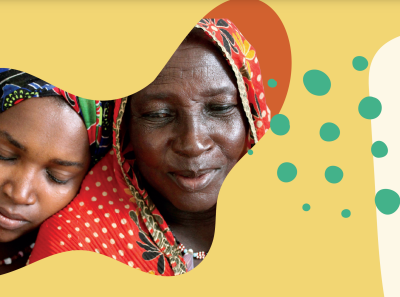Site editor:
Joaquim Cardoso MSc
The Health Institute — for continuous health transformation
October 4, 2022
Key messages:
2022 Campaign:
- Dementia is one of the greatest health challenges of our generation.
- “Although dementia is the 7th leading cause of death globally, dementia research accounts for less than 1.5% of total health research output”
Burden of Disease & Cost of Disease [2017 report]
In 2015, dementia affected 47 million people worldwide (or roughly 5% of the world’s elderly population), a figure that is predicted to increase to 75 million in 2030 and 132 million by 2050 [updated to 78 million in 2022]
- Recent reviews estimate that globally nearly 9.9 million people develop dementia each year; this figure translates into one new case every three seconds.
- Nearly 60% of people with dementia currently live in low- and middle-income countries and most new cases (71%) are expected to occur in those countries.2,3
Dementia leads to increased costs for governments, communities, families and individuals, and to loss in productivity for economies.
- In 2015, dementia costs2 were estimated at US$ 818 billion, equivalent to 1.1% of global gross domestic product, ranging from 0.2% for lowand middle-income countries to 1.4% for high income countries.
- By 2030, it is estimated that the cost of caring for people with dementia worldwide will have risen to US$ 2 trillion, a total that could undermine social and economic development globally and overwhelm health and social services, including long term care systems specifically.3
WHO and the World Bank estimate a need by 2030 for
- 40 million new health and social care jobs globally and
- about 18 million additional health workers, primarily in low-resource settings, in order to attain high and effective coverage with the broad range of necessary health services.
- In addressing dementia, expanding the health and social care workforce with appropriate skill mixes as well as available interventions and services will be essential to prevent, diagnose, treat and care for people with dementia.
Crucially, although age is the strongest known risk factor for the onset of dementia, it is not an inevitable consequence of ageing.
- Further, dementia does not exclusively affect older people, with young onset dementia (defined as the onset of symptoms before the age of 65 years) accounting for up to 9% of cases.4
- Some research has shown a relationship between the development of cognitive impairment and lifestyle-related risk factors that are shared with other noncommunicable diseases.
These risk factors include physical inactivity, obesity, unbalanced diets, tobacco use and harmful use of alcohol as well as diabetes mellitus and mid-life hypertension.
- Other potentially modifiable risk factors more specific to dementia include mid-life depression, low educational attainment, social isolation and cognitive inactivity.
- Additionally, non-modifiable genetic risk factors exist that increase a person’s risk of developing dementia.5
- There is also evidence suggesting that overall more women develop dementia than men.3
Dementia is a major cause of disability and dependency among older adults worldwide, having a significant impact not only on individuals but also on their carers, families, communities and societies.
- Dementia accounts for 11.9% of the years lived with disability due to a noncommunicable disease.1
- In light of the improved life expectancy globally, this figure is expected to increase further.
A blueprint for dementia research [2022]
- With these objectives, WHO developed a blueprint for dementia research, the first WHO initiative of its kind for noncommunicable diseases.
Infographic:


Dementia is one of the greatest health challenges of our generation.
“Although dementia is the 7th leading cause of death globally, dementia research accounts for less than 1.5% of total health research output” said Dr Soumya Swaminathan, WHO’s Chief Scientist.
“Sadly, we are falling behind implementing the Global action plan on the public health response to dementia 2017–25.
Addressing dementia comprehensively requires research and innovation to be an integral part of the response.”
Strategies are needed to better understand, prevent, and treat the underlying diseases that cause dementia and, at the same time, provide care and support for people with dementia and their carers.
Moreover, dementia research needs to be conducted within an enabling environment, where collaborations are fostered, and equitable and sustained investment is realized.
Strategies are needed to better understand, prevent, and treat the underlying diseases that cause dementia and, at the same time, provide care and support for people with dementia and their carers.
With these objectives, WHO developed a blueprint for dementia research, the first WHO initiative of its kind for noncommunicable diseases.
The blueprint is designed to provide guidance to policy makers, funders, and the research community on dementia research, making it more efficient, equitable, and impactful.
Specifically, the blueprint for dementia research:
- builds on and applies lessons learned from WHO efforts to prioritize research and coordinate research activities for infectious diseases;
- considers the entire dementia research spectrum, incorporating diagnostics and therapeutics, as well as emerging scientific and technological advances such as artificial intelligence, multiomics, and biomarkers;
- encompasses epidemiology, health economics, care and carer research, risk reduction, and brain health across the life course; and
- provides insights on different drivers of research, such as sustainable funding, diversity and equity, and the involvement of people with lived experience of dementia throughout the research development process.
“We can achieve progress in dementia research by strengthening and monitoring the drivers of research highlighted in the Blueprint so that they become the norm for good research practice.” said Dr Ren Minghui, WHO’s Assistant Director General UHC/Communicable & Noncommunicable Diseases.
WHO encourages national and international research agencies, together with other funding bodies, to use this blueprint to inform upcoming funding streams and operationalize the drivers of research.
Civil society can ensure that advocacy efforts are likewise aligned, supporting the drive for a more equitable, efficient, and collaborative research landscape.
Additionally, researchers can support the achievement of milestones and strategic goals of this blueprint by addressing the research gaps identified.
WHO will work with all stakeholders across relevant sectors to ensure that the actions outlined in the blueprint are implemented, milestones are achieved, and strategic goals are realized, with the ultimate aim of improving the quality of life of and support offered to people living with dementia, their carers, and families.
For more information, please visit the research blueprint page and WHO’s dementia page.
Names mentioned:
Dr Soumya Swaminathan, WHO’s Chief Scientist.
Ren Minghui, WHO’s Assistant Director General UHC/Communicable & Noncommunicable Diseases.
RELATED PUBLICATION

Overview of the Global Situation:
1.Dementia is an umbrella term for several diseases that are mostly progressive, affecting memory, other cognitive abilities and behaviour, and that interfere significantly with a person’s ability to maintain the activities of daily living.
Alzheimer disease is the most common form of dementia and may contribute to 60–70% of cases.
Other major forms include vascular dementia, dementia with Lewy bodies, and a group of diseases that contribute to frontotemporal dementia.
The boundaries between different forms of dementia are indistinct and mixed forms often coexist.
2.In 2015, dementia affected 47 million people worldwide (or roughly 5% of the world’s elderly population), a figure that is predicted to increase to 75 million in 2030 and 132 million by 2050.
Recent reviews estimate that globally nearly 9.9 million people develop dementia each year; this figure translates into one new case every three seconds. Nearly 60% of people with dementia currently live in low- and middle-income countries and most new cases (71%) are expected to occur in those countries.2,3
3.Crucially, although age is the strongest known risk factor for the onset of dementia, it is not an inevitable consequence of ageing.
Further, dementia does not exclusively affect older people, with young onset dementia (defined as the onset of symptoms before the age of 65 years) accounting for up to 9% of cases.4
Some research has shown a relationship between the development of cognitive impairment and lifestyle-related risk factors that are shared with other noncommunicable diseases.
These risk factors include physical inactivity, obesity, unbalanced diets, tobacco use and harmful use of alcohol as well as diabetes mellitus and mid-life hypertension.
Other potentially modifiable risk factors more specific to dementia include mid-life depression, low educational attainment, social isolation and cognitive inactivity.
Additionally, non-modifiable genetic risk factors exist that increase a person’s risk of developing dementia.5
There is also evidence suggesting that overall more women develop dementia than men.3
Some research has shown a relationship between the development of cognitive impairment and lifestyle-related risk factors that are shared with other noncommunicable diseases.
4.Dementia is a major cause of disability and dependency among older adults worldwide, having a significant impact not only on individuals but also on their carers, families, communities and societies.
Dementia accounts for 11.9% of the years lived with disability due to a noncommunicable disease.1
In light of the improved life expectancy globally, this figure is expected to increase further.
5.Dementia leads to increased costs for governments, communities, families and individuals, and to loss in productivity for economies.
- In 2015, dementia costs2 were estimated at US$ 818 billion, equivalent to 1.1% of global gross domestic product, ranging from 0.2% for lowand middle-income countries to 1.4% for high income countries.
- By 2030, it is estimated that the cost of caring for people with dementia worldwide will have risen to US$ 2 trillion, a total that could undermine social and economic development globally and overwhelm health and social services, including long term care systems specifically.3
- People with dementia and their families face significant financial impact from the cost of health and social care and from reduction or loss of income.
- In high-income countries, the costs related to dementia are shared between informal care (45%) and social care (40%).
- In contrast, in low- and middle-income countries social care costs (15%) pale in comparison to informal care costs.3
- The expected disproportionate increase in dementia in low- and middle income countries will contribute further to increasing inequalities between countries and populations.
6.Currently, the gap is wide between the need for prevention, treatment and care for dementia and the actual provision of these services.
Dementia is underdiagnosed worldwide, and, if a diagnosis is made, it is typically at a relatively late stage in the disease process.
Long-term care pathways (from diagnosis until the end of life) for people with dementia are frequently fragmented if not entirely lacking.
Lack of awareness and understanding of dementia is often to blame, resulting in stigmatization and barriers to diagnosis and care.
People with dementia are frequently denied their human rights in both the community and care homes.
In addition, people with dementia are not always involved in decision-making processes and their wishes and preferences for care are often not respected.
7.WHO and the World Bank estimate a need by 2030 for 40 million new health and social care jobs globally and about 18 million additional health workers, primarily in low-resource settings, in order to attain high and effective coverage with the broad range of necessary health services.
In addressing dementia, expanding the health and social care workforce with appropriate skill mixes as well as available interventions and services will be essential to prevent, diagnose, treat and care for people with dementia.












